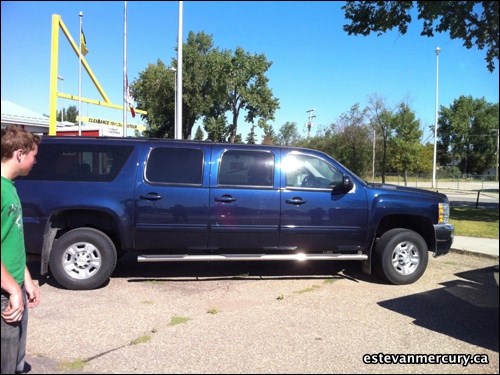A Lampman family is frustrated by bureaucracy and red tape after a vehicle of theirs has been left stranded at the North Portal border crossing for nine months.
Edwin and Alison Morris have a family 10 and they have been in search of a safe vehicle that accommodates their entire family. Finding no suitable options in Canada, they found a man in Oklahoma to modify their truck by welding on the back of a suburban. When they returned to Canada in August 2011 with the modified vehicle, it was deemed inadmissible and has been sitting at the North Portal border station ever since.
"They wouldn't let it through the border because the frame had been modified," said Alison. "That's what we were told."
Border agents showed them a copy of the Registrar of Imported Vehicles rule regarding importing a vehicle purchased in the United States.
"That's not what we did; we didn't purchase it in the United States."
They took the truck to Custom Autos by Tim, a company they found on eBay in Oklahoma, to make the modifications they needed. The truck has now been sitting at the North Portal border since Aug. 15, 2011.
The Mercury contacted Transport Canada and received an e-mail response from Maryse Durette, a senior adviser, saying, "Bringing back to Canada a Canadian-certified vehicle after having it altered in another country constitutes importation, and the importer must comply with the Canadian regulations."
In January 2011, Alison called a 1-800 number for the Canadian Border Services Agency and after speaking to a supervisor was told the modified vehicle wouldn't be considered an import on its return to Canada.
He told her to make sure they had a bill, paid any applicable taxes or duty and it would be admissible.
"I said, 'Are you sure, because we already know we cannot purchase one like this and import it.' He said 'No, you wouldn't be allowed to do that, but this is will be OK.'"
Alison said the CBSA is now denying they were given bad information. The family received a letter a couple of weeks ago from Vic Toews, the minister of public safety, informing them that he had the CBSA investigate themselves. As a result of the investigation, they found themselves to have committed no wrong.
Transport Canada said there is a process the family can follow in order to get their vehicle back.
Durette said, "The company or mechanics that did the modifications need to demonstrate that vehicle still meets Canadian standards. I understand that once that has been done, by way of re-certification, the vehicle can re-enter Canada."
"We're the ones that modified this vehicle," said Edwin. "We paid someone to modify it, so we're the only person that can put that (certification) sticker on legally."
Alison said that for them, it doesn't seem to be as simple as Transport Canada suggests.
"They can't inspect it. They won't let anyone else inspect it. Provincial inspections are inferior. Even if we tested it, even if we built another one like it and crashed it, did all the tests on it, they wouldn't accept the results because it's on used parts," she said. "They're saying that if we provided the certification information, they would review it. That's their answer they're giving the media. It's misleading because they've already told us they won't accept the results if we've provided them."
Part of the Morrises' frustration comes from trying to make sure they did everything legally. Alison stressed they were trying to comply with the system in order to provide a safe vehicle that could accommodate their family.
The truck frame and body were cut behind the cab, taking the back of the cab off. The frame and back part of the suburban were cut behind the front row and welded to the truck. The wheel, brakes and axle are all original parts from the truck.
"It's the same length, the wheel base as a crew cab on a long-bed truck so it can use the same brake lines."
The finished product extended the original vehicle by 15 inches and includes an extra row of doors.
The suburban parts used for the back of the truck were purchased in the United States, and Alison said that's what they were claiming on their return to Canada.
Their story is getting national attention. While speaking to The Mercury at the Estevan office, they received a call for an interview request later that evening from a Toronto media outlet.
The Morrises feel as though they are running out of options and that perhaps the only thing that can now help them is for some political will in their corner. Anyone who wishes is free to write their member of Parliament and share the Morrises' story.
For now, the vehicle remains at the North Portal border station.




